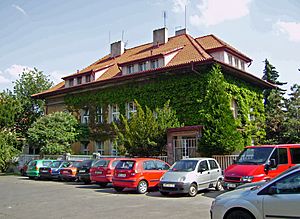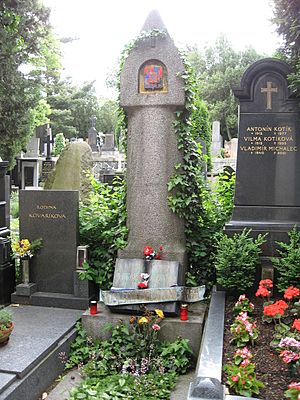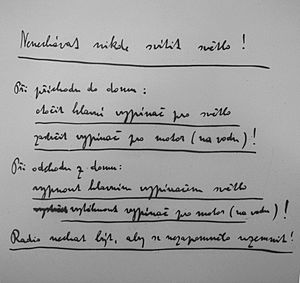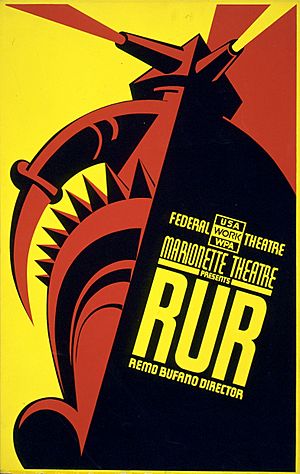Karel Čapek facts for kids
Quick facts for kids
Karel Čapek
|
|
|---|---|
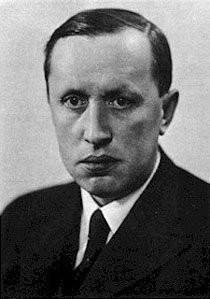 |
|
| Born | 9 January 1890 Malé Svatoňovice, Austria-Hungary |
| Died | 25 December 1938 (aged 48) Prague, Czechoslovakia |
| Pen name | K. Č., B. Č. |
| Occupation | Novelist, dramatist, journalist, theorist |
| Nationality | Czech |
| Alma mater | Charles University in Prague |
| Genre | Science fiction, Fairy tales, Political satire |
| Notable works | R.U.R Válka s mloky (War with the Newts) Bílá nemoc (The White Disease) Továrna na absolutno (The Absolute at Large) Krakatit |
| Notable awards | |
| Spouse | Olga Scheinpflugová |
| Relatives | Josef Čapek (brother) Helena Čapková (sister) |
| Signature | |
 |
|
Karel Čapek (born January 9, 1890 – died December 25, 1938) was a famous Czech writer, playwright, and critic. He is best known for his exciting science fiction stories. These include his novel War with the Newts (1936) and his play R.U.R. (Rossum's Universal Robots, 1920). This play was very important because it introduced the word robot to the world!
Čapek also wrote many works about the social problems of his time. He believed in free expression and was strongly against the rise of fascism and communism in Europe. He was nominated for the Nobel Prize in Literature seven times, but he never won. However, several awards are named after him, like the Karel Čapek Prize. This award celebrates writing that supports democratic and human values. He also helped start the Czechoslovak PEN Club, which is part of International PEN.
Karel Čapek died just before World War II began. He had a lifelong health condition that led to his death. After the war, he became even more famous as a great writer.
Contents
Karel Čapek's Life
Early Life and School
Karel Čapek was born in 1890 in a small village called Malé Svatoňovice in the Bohemian mountains. When he was six months old, his family moved to their own house in Úpice. Karel's father, Antonín Čapek, was a doctor at a local factory. He was very active in the community. He helped start the local museum and was on the town council.
Karel's mother, Božena Čapková, stayed at home. She didn't like country life and often felt sad. But she loved collecting local stories, songs, and legends. Karel was the youngest of three children. He was very close to his brother Josef, who became a famous painter. They lived and worked together for most of their adult lives. His sister, Helena, was a talented pianist and later became a writer. She wrote books about Karel and Josef.
After elementary school, Karel moved to Hradec Králové to attend high school. He was expelled two years later for being part of a student club. Čapek called it a "very non-murderous anarchist society." After this, he moved to Brno with his sister to finish high school. Two years later, he moved to Prague, where he graduated in 1909. As a teenager, Čapek loved art, especially Cubism, which later influenced his writing.
After high school, he studied philosophy and art in Prague at Charles University. He also spent time studying in Berlin and Paris. While still a student, he wrote about modern art and literature. He earned his doctorate in philosophy in 1915.
World War I and Later Years
Karel Čapek could not join the military because of back problems. He watched World War I from Prague. The war greatly changed his political ideas. As a young journalist, he started writing about topics like nationalism (strong loyalty to one's country), totalitarianism (a government with total control), and consumerism (buying many goods).
He became friends with many important political leaders in the new country of Czechoslovakia. These included Tomáš Garrigue Masaryk, the first President of Czechoslovakia, and his son Jan Masaryk. T. G. Masaryk often visited Čapek's "Friday Men" garden parties for smart Czech thinkers. Čapek was also part of Masaryk's political group. Their talks became the basis for Čapek's book Talks with T. G. Masaryk.
Čapek started his writing career as a journalist. He worked with his brother Josef as an editor for the Czech newspaper Národní listy (The National Newspaper) from 1917 to 1921. Then, they both joined Lidové noviny (The People's Paper) in 1921.
Čapek's first fiction works were short stories and plays, often written with Josef. His play R.U.R. was his first big international success. It was a story about a factory where human-like robots were made. The play was translated into English in 1922 and performed in the UK and America by 1923. In the 1920s, Čapek wrote many types of works, both fiction and non-fiction, but he mainly worked as a journalist.
In the 1930s, Čapek's work focused on the danger of brutal Nazi and fascist governments. By the mid-1930s, he was openly against fascism. He also became a member of the International PEN Club and was the first president of the Czechoslovak PEN Club.
Final Years and Death
In 1935, Karel Čapek married actress Olga Scheinpflugová. They had known each other for a long time. In 1938, it became clear that countries like France and the United Kingdom would not protect Czechoslovakia from Nazi Germany. Čapek was offered a chance to go to England, but he refused to leave his country. The Nazi secret police (Gestapo) even called him "public enemy number two."
While fixing flood damage at his family's summer house, he caught a cold. Because he had suffered from a back condition his whole life and was a heavy smoker, Karel Čapek died of pneumonia on December 25, 1938.
The Gestapo did not know he had died. Several months later, after Germany invaded Czechoslovakia, Nazi agents came to his house to arrest him. When they found out he was already dead, they arrested his wife Olga. She was later released and lived until 1968. She died on stage while performing one of her husband's plays. His brother Josef was arrested and died in a concentration camp in 1945. Karel Čapek and his wife are buried in the Vyšehrad cemetery in Prague.
Karel Čapek's Writing Style
Karel Čapek wrote about many different topics. His works are known for describing reality very clearly. He is also famous for how he used the Czech language.
He is known as a science-fiction author even before science fiction became a popular type of writing. Many of his stories explore the moral questions about new inventions and technologies. These include mass production, nuclear weapons, and smart artificial beings like robots. He wrote most of his important works during the time of the First Republic of Czechoslovakia (1918–1938).
Čapek also worried about social problems like dictatorships, violence, human foolishness, and the unlimited power of big companies. He always tried to find hope and solutions. From the 1930s, his work became strongly against fascism and war.
Writer Ivan Klíma said that Čapek greatly influenced modern Czech literature. He also helped the Czech language become closer to how people actually spoke. Čapek was also a translator. His translations of French poetry inspired new Czech poets.
His books and plays include detective stories, novels, fairy tales, theatre plays, and even a book about gardening. His most important works tried to answer the question: "What is knowledge?" Examples include Tales from Two Pockets and his trilogy of novels: Hordubal, Meteor, and An Ordinary Life.
After World War II, the communist government in Czechoslovakia did not fully accept Čapek's work. This was because he had refused to support communism during his life. He was one of the first important thinkers to write an essay called "Why I am not a Communist."
In 2009, a book was published with many letters from Karel Čapek. In these letters, he discussed pacifism (being against war) and his objection to military service.
Where the Word Robot Comes From
Karel Čapek made the word robot famous around the world. It first appeared in his play R.U.R. in 1920. Many people think he invented the word. However, he wrote a letter saying that his brother, Josef Čapek, actually came up with it.
In a Czech newspaper article in 1933, Karel explained that he first wanted to call the creatures laboři. This word comes from the Latin word labor, meaning "work." But he didn't like it because it sounded too artificial. So, he asked his brother Josef for advice, and Josef suggested roboti.
The word robot comes from the Czech word robota. In Czech, robota means "forced labor" or "hard work." It also means "work" or "labor" in many other Slavic languages like Slovak, Russian, and Polish. It comes from an old Slavic word meaning "work" or "obligatory work."
Awards and Honors
- The asteroid 1931 Čapek was named after him.
- He received the Order of Tomáš Garrigue Masaryk in 1991, after his death.
- Richard E. Pattis named the Karel (Programming Language) after Čapek.
Selected Works
Plays
- 1920 – The Outlaw (Loupežník)
- 1920 – R.U.R. (Rossum's Universal Robots) – A play featuring some of the first examples of human-like artificial intelligence in art.
- 1921 – Pictures from the Insects' Life (Ze života hmyzu) – Also known as The Insect Play, written with Josef Čapek. It's a funny story where insects act like different kinds of humans.
- 1922 – The Makropulos Affair (Věc Makropulos) – A play about human immortality, which inspired an opera by Leoš Janáček.
- 1927 – Adam the Creator (Adam stvořitel) – The main character tries to destroy the world to make a better one.
- 1937 – The White Disease (Bílá nemoc) – About a peaceful doctor and a military leader. This play was Čapek's response to the growing threat of the Nazis before World War II.
- 1938 – The Mother (Matka)
Novels
- 1922 – The Absolute at Large (Továrna na absolutno) – A novel that can be seen as a look into a future where people buy too much.
- 1922 – Krakatit – A novel that includes a prediction of a powerful explosive, similar to a nuclear weapon.
- 1933 – Hordubal – The first part of a trilogy of novels.
- 1934 – Meteor (Povětroň) – The second part of the trilogy.
- 1934 – An Ordinary Life (Obyčejný život) – The third part of the trilogy.
- 1936 – War with the Newts (Válka s mloky) – A funny and dark novel about a future society.
- 1937 – The First Rescue Party (První parta) – A novel based on the experiences of a rescue team after a mining accident.
- 1939 – Life and Work of the Composer Foltýn (Život a dílo skladatele Foltýna) – An unfinished novel published after his death.
Travel Books
- Letters from Italy (Italské listy, 1923)
- Letters from England (Anglické listy, 1924)
- Letters from Spain (Výlet do Španěl, 1930)
- Letters from Holland (Obrázky z Holandska, 1932)
- Travels in the North (Cesta na Sever, 1936)
Other Works
- Stories from a Pocket and Stories from Another Pocket (Povídky z jedné a z druhé kapsy) – A collection of short detective stories.
- How it is Made (Jak se co dělá) – Funny novels about life in the theater, newspapers, and movie studios.
- The Gardener's Year (Zahradníkův rok, 1929) – A charming guide to gardening throughout the year, with drawings by his brother Josef.
- Apocryphal Tales (Kniha apokryfů, 1932) – Short stories about famous people from history and literature, like Hamlet or Alexander the Great.
- Nine Fairy Tales: And One More Thrown in for Good Measure (Devatero Pohádek a ještě jedna od Josefa Čapka jako přívažek, 1932) – A collection of fairy tales for children.
- Dashenka, or the Life of a Puppy (Dášeňka čili Život štěněte, 1933) – A book about a puppy.
See also
 In Spanish: Karel Čapek para niños
In Spanish: Karel Čapek para niños
- Brothers Čapek
- Czech science fiction and fantasy
 | Bessie Coleman |
 | Spann Watson |
 | Jill E. Brown |
 | Sherman W. White |


